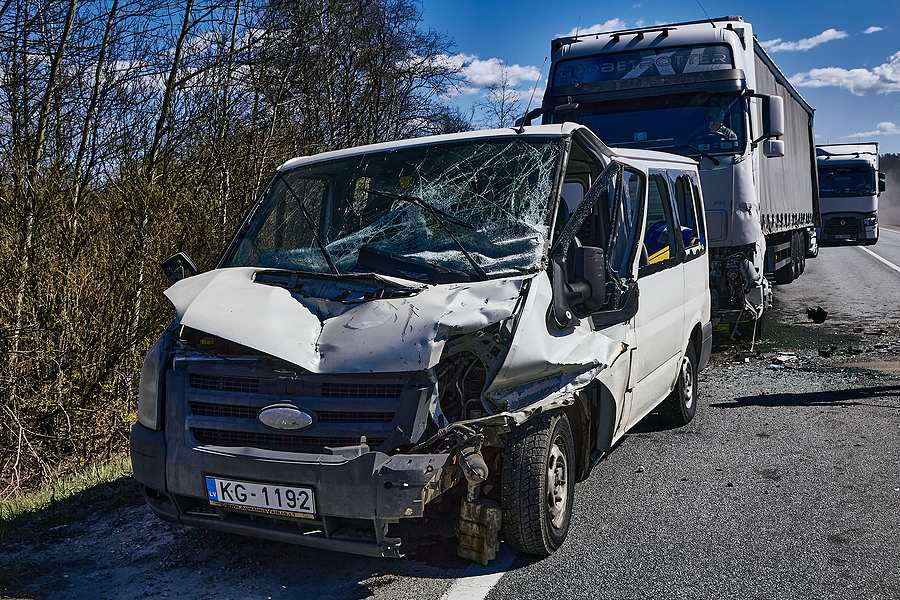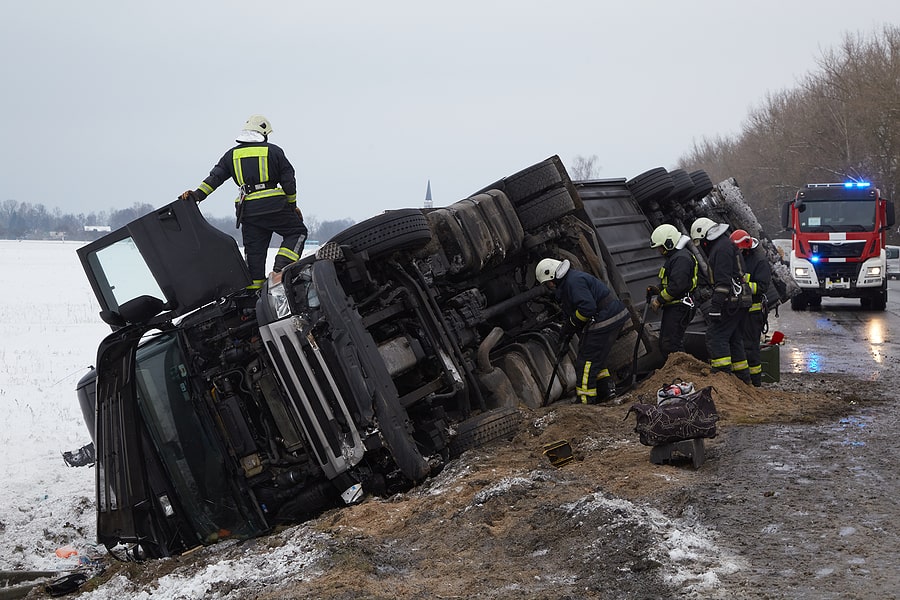Truck accidents can result in serious if not fatal, injuries. If you or your loved one suffered injuries in a trucking accident, you may be entitled to compensation for your injuries and other damages if the truck driver’s actions played a role in your injuries. But what if you were partly to blame for your truck accident? Under New York’s comparative negligence law, you may still be able to recover compensation. A Long Island truck accident lawyer can review your case to determine all liable parties and inform you of your legal options.
What is Comparative Negligence?

Comparative negligence is a legal principle used in personal injury claims and lawsuits, including truck accident cases, to determine the extent of fault or responsibility of each party involved in an accident. It helps determine how damages or compensation should be awarded when two or more parties share blame for an injury or accident. Comparative negligence is designed to be a fair and equitable way to allocate responsibility in cases where more than one party is at fault.
Here’s how comparative negligence works: The insurance company — or the court or a jury in the case of a lawsuit — assesses the evidence and testimony to determine the percentage of fault for each party involved in the accident. This process involves considering factors like negligence, carelessness, and the specific actions or decisions that led to the injury.
Once the percentages of fault are determined, the damages are calculated. The final amount of compensation is determined by subtracting the plaintiff’s percentage of fault from the total damages they would have received if they were not at fault. For example, if the plaintiff is found to be 20% at fault, their total damages will be reduced by 20%. So, if the plaintiff’s damages are calculated at 10,000, the plaintiff would only receive $8,000 ($10,000-20%).
There are two main types of comparative negligence: pure comparative negligence and modified comparative negligence.
What is New York’s Comparative Negligence Rule?
New York is one of about 13 states that follows a pure comparative negligence rule in personal injury cases, including truck accident cases. This means that even if an injured party is primarily responsible for their own injuries, they can still recover damages. The damages they receive are reduced by their percentage of fault. For example, if a plaintiff is found to be 60% at fault, they can still recover 40% of the damages awarded.
Some states have adopted a modified comparative negligence rule with a 50% or 51% bar. States that follow a modified comparative negligence rule with a 50% bar allow an injured party to recover damages only if their fault is equal to or less than the defendant’s fault. If their percentage of fault exceeds 50%, the plaintiff cannot recover any damages.
States that follow a comparative negligence rule with a 51% bar allow plaintiffs to recover damages if their fault is less than or equal to 51%. If their percentage of fault exceeds 51%, the plaintiff cannot recover any damages.
About four states follow a contributory negligence rule. Contributory negligence is a legal doctrine that can completely bar an injured party from recovering any compensation if they are found to have contributed, even in the slightest way, to their own injuries or the accident. It is a strict and harsh legal rule that operates as an “all-or-nothing” principle. This rule can be particularly harsh on plaintiffs in personal injury cases because even minor negligence on their part can lead to a complete loss of the right to seek compensation.
How is Someone at Fault for a Truck Accident?
In a truck accident case, as in any personal injury case based on negligence, the plaintiff typically needs to establish four key elements to prove that the defendant was negligent. These elements are:
- Duty of Care: The plaintiff must demonstrate that the defendant owed a duty of care to the plaintiff. In a truck accident case, this duty of care is usually established by showing that the truck driver and/or the trucking company had a legal obligation to operate the vehicle safely and in accordance with all relevant laws and regulations.
- Breach of Duty: The plaintiff must then show that the defendant breached their duty of care. This means that the defendant failed to meet the standard of care expected of a reasonable person or, in the case of a professional driver, the standard of care expected of a reasonably skilled and prudent truck driver. Breach of duty can take many forms, such as speeding, reckless driving, driving under the influence, or failing to properly maintain the truck.
- Causation: The plaintiff must establish that the defendant’s breach of duty was the direct and proximate cause of the accident and the plaintiff’s injuries. This means showing that the accident would not have occurred “but for” the defendant’s negligence.
- Damages: To have a valid negligence claim, the plaintiff must have suffered actual damages. These can include physical injuries, property damage, medical bills, lost wages, pain and suffering, and other losses resulting from the accident.
How Can I Be Partly Responsible for My Truck Accident Injuries?
Truck accidents often occur due to truck driver error. But in some situations, the driver of the vehicle involved in an accident with a large commercial drug may be partially to blame. Some behaviors that may make motor vehicle operators partially liable in a truck accident include:
- Distracted driving
- Speeding
- Failure to yield the right of way
- Following too closely
- Driving under the influence
- Aggressive driving/road rage
- Ignoring traffic signals
- Failing to maintain control due to adverse road conditions or inclement weather
If you are involved in a truck accident, it’s important never to admit fault, even if you think you are partly to blame, especially to an insurance company. Your words may be used against you to devalue the compensation you deserve. Instead, let law enforcement and your lawyer determine the cause of the accident and whether your actions played a role.
Who May be Held Liable in a Truck Accident Case?
Liability in a truck accident case can be complex. While the truck driver may be the first party to come to mind, multiple parties may be involved. The specific parties held liable can vary depending on the circumstances of the accident. Here are some parties that may play a role in a truck accident:
- Trucking Company: The company that employs the truck driver may also be held liable. This is often the case if the company was negligent in hiring, training, or supervising the driver, or if they pressured the driver to violate safety regulations, such as driving excessive hours.
- Truck Owner: If the truck is owned by someone other than the driver or the trucking company, the owner may be liable if they were negligent in maintaining the vehicle, ensuring it was safe to operate, or if there were equipment failures.
- Truck Manufacturer: In some cases, a defect in the truck’s design or manufacturing may have contributed to the accident. In such cases, the truck manufacturer or the manufacturer of specific truck components may be held liable.
- Cargo Loaders: If the accident was caused by improperly loaded or secured cargo, the individuals or companies responsible for loading the cargo may be liable.
- Maintenance Companies: Companies responsible for maintaining the truck may be held liable if a mechanical failure or maintenance issue contributed to the accident.
- Government Entities: If the accident was caused by hazardous road conditions, such as poorly maintained roads or inadequate signage, a government entity responsible for road maintenance and safety may be held liable.
- Other Drivers: In some cases, the actions of other drivers on the road may contribute to a truck accident. They can be held liable if their negligence played a role in the crash.
Determining liability in a truck accident case often involves a thorough investigation, which may include gathering evidence, witness statements, police reports, and expert analysis. The specific circumstances of the accident, along with state and federal regulations, will play a significant role in determining which parties are liable and to what extent. It’s important to consult with an attorney experienced in handling truck accident cases to navigate the legal process and ensure your rights are protected.
A Truck Accident Lawyer Can Help if You’re Partly to Blame for Your Accident

In the aftermath of a trucking accident, it’s natural to grapple with feelings of guilt and uncertainty about your role in the incident. While self-reflection and accountability are important, it’s equally vital to remember that accidents often result from a complex interplay of factors, and assigning blame is not always straightforward. Contact a Long Island personal injury lawyer from Rosenberg & Gluck LLP for your free consultation. We can evaluate your case and help you get the compensation you deserve.








